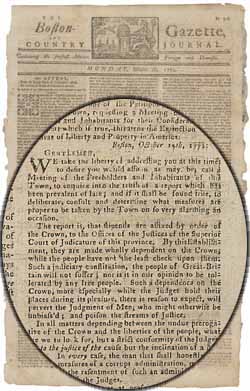Collections Online
"The following is one of the Petitions to the Selectmen of this Town ..."
To order an image, navigate to the full
display and click "request this image"
on the blue toolbar.
-
Choose an alternate description of this item written for these projects:
- Main description
[ This description is from the project: Coming of the American Revolution ]
This petition, signed by 106 Bostonians, calls for the town selectmen to hold a meeting to discuss the recent proposals by Parliament that judges' salaries will be paid by the crown instead of the colony's General Court, from revenue gathered by the American Board of Customs Commissioners (established by the Townshend Acts in 1767).
"Pervert the Judgment of Men"
Despite Samuel Adams' (and others') attempts to rouse Bostonians into political action, the town experiences a period of relative calm following the trying events of 1770. Parliament, however, provides a new source of anxiety in the fall of 1772. In September, Bostonians hear whispers of another ministerial plot: judges' salaries will soon be paid by the crown instead of the colony's General Court. If such rumors prove to be true the consequences could be dire. Patriots are also distressed by the news that the salaries will be paid with revenue gathered by the American Board of Customs Commissioners (established by the Townshend Acts in 1767). Adams proposes the creation of a corresponding society to communicate with other colonies and ascertain their thoughts on the matter. Meanwhile, when Governor Thomas Hutchinson (whose salary is already being paid by the crown) refuses to convene the legislature to discuss the matter, Bostonians petition their selectmen requesting a town meeting.
To examine all four pages of this newspaper, please see the online display of the The Boston-Gazette, and Country Journal, 26 October 1772.
Questions to Consider
1. Who created this petition?
2. What is the author requesting and why?
3. Why is the author concerned about the crown paying the judges' salaries?
Further Exploration
4. In the fifth paragraph of the petition, the author writes, "This Town has long been struggling to prevent the Miseries which its Wisdom has foreseen." Can you find other documents on this website that predict "miseries" in Boston?
5. Why would patriots be distressed by the idea of the American customs service providing revenue for the judges' salaries? Hint: learn more about the customs service, including how it was created and why, and where the customs offices are located.

